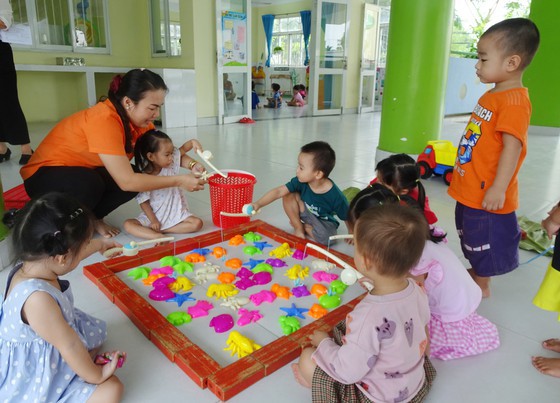 Society
Society

The HCM City Department of Education and Training has proposed financial support for preschool teachers and students, with aid to be given first to preschools located near industrial parks and export processing zones where many workers live.

|
| A teacher and her students during playtime at a kindergarten in HCM City’s Hóc Môn District. — Photo www.sggp.org.vn |
HCM CITY — The HCM City Department of Education and Training has proposed financial support for preschool teachers and students, with aid to be given first to preschools located near industrial parks and export processing zones where many workers live.
Speaking at an online conference last week, Lê Hoài Nam, deputy director of the city’s Department of Education and Training, said the 2021-22 academic year was without precedent and that preschool students were still out of school due to the COVID-19 pandemic.
“Preschools, especially private preschools, are suffering the most from the impact of the pandemic due to the limitations of online teaching methods,” he said.
Under the proposal, preschool teachers would receive VNĐ800,000 (US$35.3) monthly and preschool students VNĐ160,000 ($7) monthly.
All educational institutions must be prepared when schools reopen for in-person learning, and plan for teaching and learning online if the pandemic continues.
“However, preschools have not been able to implement online teaching like other educational levels due to the characteristics of preschool-age children,” Nam said.
He said that preschools should develop indirect teaching methods such as video lessons sent to parents to help their children at home.
In the coming time, the department will work with the city’s Department of Labor, War Invalids and Social Affairs to develop an appropriate support regime for teachers as well as other non-teaching staff in probationary periods who have not received support.
Lương Thị Hồng Điệp, head of the Department of Education and Training’s Preschool Education Division, said that preschool education would focus on the universalisation of preschool for children under five years old, as well as national quality standards, homestay nurseries, small baby-sitting groups and private kindergartens.
The aim is to increase the percentage of five-year-old children attending part-time courses in suburban districts, and to continue to teach English through extracurricular activities when children return to schools.
Because many private preschools have had to stop operations due to financial difficulties caused by the pandemic, local education agencies should help families move their children to a new school, he said.
Preschool teachers will also be given favourable conditions to improve their professional skills and teaching methods.
Lý Thị Sương, deputy head of the Preschool Education Division, said the city has 1,368 preschools, including 472 public schools.
There are 1,086 educational establishments, groups and classes at the preschool level that are private.
The number of pre-school-aged children attending school is more than 355,000, including about 157,100 children, or 44.3 per cent, attending public schools.
More than 16,600 preschool teachers work under direct contracts with their schools.
To attract more preschool teachers, the city has provided financial support of VNĐ248 billion ($10.9 million) to new graduates working at public preschools, and VNĐ206 billion ($9 million) to preschool teachers working under contracts for less than 12 months and other foster care staff.
The city has invested more than VNĐ1.4 trillion ($61.8 million) to build or upgrade preschools and equip preschools with more teaching tools.
In the 2021-22 academic year, the preschool level is expected to have 27 more educational establishments and an increase of 5,140 students.
The increasing number of preschool students is mainly in outlying districts and Thủ Đức city which are undergoing rapid urbanization with many industrial parks and export processing zones.
The city has about 200 preschools recognised as meeting national standards and 16 preschools being developed with advanced integration models following global and regional trends. — VNS




